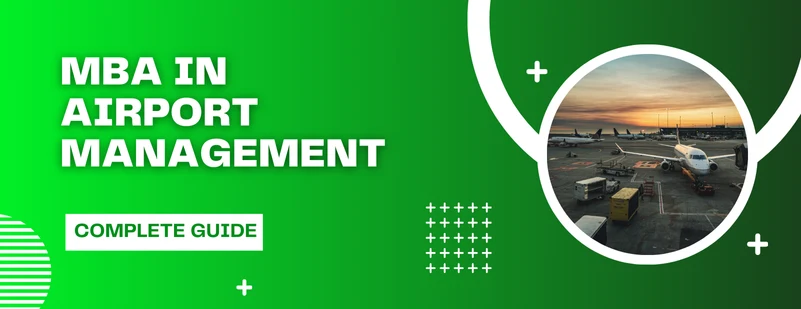The aviation sector is booming—air travel demand is rising, new airports are under development, and airlines are expanding fleets globally. In such a dynamic industry, leadership roles require more than domain knowledge, they demand a blend of business acumen, operations know-how, and a grasp of aviation regulation.
An MBA in Airport Management (or its variant MBA in Airline and Airport Management) is tailored to produce such professionals. This specialization is designed to train graduates in both managerial and technical aspects of airports and allied operations.
Below is a deep dive into everything you need to know before opting for this specialization.
Table of Contents
Why Choose an MBA in Airport Management?
Here are key motivations and benefits:
- Industry growth and demand: The global aviation sector is projected to double traffic by 2040, driving demand for qualified managers.
- Niche specialization: Rather than a general MBA, you gain domain expertise in airport operations, airline–airport integration, safety, logistics, and more.
- Diverse roles: You can work in airport authorities, ground handling, cargo, regulatory bodies, aviation consultancies, etc.
- Global mobility: Aviation is inherently global, opening doors to international jobs.
- Competitive pay packages: Because the domain is specialized, compensation can outpace general management roles in some cases.
The buzzword “MBA in Airline and Airport Management” is practically interchangeable in many institutions, signaling the integrated nature of airline–airport operations. The term MBA in Airline Management leans more heavily on airline-side functions like route planning, pricing, fleet management, etc.
Eligibility & Admission Process
Eligibility Criteria
| Requirement | Detail |
|---|---|
| Bachelor’s degree | Any discipline, from a recognized university |
| Minimum percentage | Generally 50–60% (varies by institution) |
| Entrance exam | CAT, MAT, XAT, CMAT, GMAT, or institution-specific test |
| Final year students | Often allowed to apply provisionally if results are pending |
Admission Process (Step by Step)
- Take an entrance exam (e.g. CAT, XAT, CMAT)
- Apply to colleges with required documents
- Shortlisting based on exam score + past academic performance
- Group Discussion / Personal Interview (GD-PI)
- Final selection & seat acceptance
Tip: Some aviation-specialized colleges may also include domain-specific tests or interview rounds focusing on aviation knowledge.
MBA in Airport Management: Course Structure & Syllabus
The curriculum blends standard MBA subjects with aviation/airport modules. Here’s a semester-wise overview:
| Semester | Core MBA Subjects | Aviation / Airport Modules |
|---|---|---|
| Semester 1 | Principles of Management, Organizational Behavior, Business Communication, Managerial Economics | Aviation Industry Overview, Airport Systems Fundamentals |
| Semester 2 | Financial Management, Marketing Management, Operations Management | Airport Operations, Ground Handling, Safety & Security |
| Semester 3 | Strategic Management, International Business, HR Management | Aviation Law & Policies, Air Cargo & Logistics, Airline Cooperation |
| Semester 4 | Electives, Dissertation / Project | Aviation Marketing, Airport Finance, Emerging Trends (e.g. Smart Airports) |
Additionally, practical training, case studies, guest lectures, industry visits, and internships form an essential component in most programs.
Top Colleges in India for MBA in Airport / Aviation Management
Here is a comparison table of some of the well-known institutions in India offering MBA / aviation / airport specialization; with fees, placement stats, and entrance exams:
| College / Institution | Location | Approx. Fee (2 years or total) | Average / Notable Placement | Entrance Exam / Selection Criteria |
|---|---|---|---|---|
| Hindustan Institute of Technology & Science (HITS) | Chennai | ₹4,31,500 (tuition) + other fees = ~₹6+ lakhs total | Average ~ ₹4.5 LPA, highest up to ~₹25 LPA | HITSCAT + college-level screening |
| National College of Aviation (NCA), Egmore | Chennai | ₹2,00,000 total tuition | Placements tied with major airlines / aviation recruiters | Graduation + exam / interview |
| Boston Institute / Boston College (MBA in Airline & Airport Management) | Madurai / affiliated with Alagappa University | ~ ₹1,00,000 total | Moderate – on par with regional aviation aspirants | Graduation + screening, possibly interview / entrance test |
| Nehru College of Aeronautics & Applied Sciences (NCAAS) | Coimbatore | — (private) | Average package ₹2.50 lakh, highest ~ ₹18 LPA | Graduation + GD/PI / test |
| UPES (University of Petroleum & Energy Studies) | Dehradun | ~ ₹2.40 lakhs per year (or more) in related aviation programs | Reputed placements in aviation / energy sectors | National-level MBA exams, University selection criteria |
| Manav Rachna Institute | Faridabad / Haryana | ~ ₹1,82,000 total for aviation specialization | Medium – cited in rankings list | CAT / MAT / XAT / CMAT + college screening |
Notes & caveats
- Fees and placement numbers change yearly; always verify from college websites before applying.
- “Average / notable placement” often includes core and non-core roles; pure aviation roles are fewer.
- Some colleges may require additional domain aptitude or interview rounds specific to aviation / airport operations.
This comparison helps you filter colleges based on fee affordability, placement strength, and entrance exam compatibility.
Internship & Industry Exposure: A Critical Component
In such a specialized field, internships and real-world exposure can make or break your career trajectory.
Why internships matter:
- You learn to apply theoretical concepts in real settings.
- Industry contacts during internship often lead to pre-placement offers.
- You gain clarity about your preferred sub-domain (airline, ground handling, cargo, etc.).
Typical internship domains:
- Airport operations and terminal services
- Ground handling agencies
- Cargo and logistics units
- Airline operations, route planning, network analysis
- Airport planning, capacity analysis
- Aviation consultancies, safety audits
Many good programs mandate a 6–12 week internship. Some even arrange them via tie-ups with airlines, airport authorities, IATA, etc.
Skills Roadmap: What You Must Build
To truly excel, you should consciously develop the following:
1. Technical & domain knowledge
- Aviation regulation, safety & security protocols
- Airport systems (ground handling, baggage, check-in, cargo)
- Airline scheduling, route planning
2. Business & analytical skills
- Financial modelling, budgeting for airport projects
- Data analysis, forecasting, KPI tracking
- Strategic decision-making
3. Soft skills & management
- Leadership, communication, negotiation
- Crisis management, risk handling
- Customer service orientation
4. Digital literacy
- Familiarity with aviation software (Amadeus, Sabre, JS for scheduling)
- IoT, AI, smart airport tech knowledge
5. Regulatory & compliance knowledge
- International Civil Aviation Organization (ICAO) standards
- Local civil aviation authority rules
- Environmental compliance
A well-rounded portfolio combining domain strength + managerial & tech skills gives you an edge.
Global Scope & Career Mobility
One of the prime attractions of an MBA in Airport Management is global mobility. Here’s how:
- International airports and airlines: Your knowledge of airport operations is transferable across countries (with some adaptation to local regulation).
- Consulting & advisory: You can work with global consultancies advising airport expansion, privatization, or infrastructure projects.
- Airport planning & design firms: Involvement in next-gen smart/green airport projects globally.
- Regulatory authorities: Opportunities in ICAO, ACI (Airport Council International), or country-level civil aviation bodies.
- Aviation fintech / tech firms: As airports adopt digital systems, there’s demand for project managers, product leads, etc.
In other words — while you might start in a domestic role, doors to international assignments often open within mid-career if you have demonstrable domain skill.
Salary Trends & Growth Trajectory
Here’s a refined salary breakdown for MBA in Airport / Aviation Management:
| Experience Level | Typical Role(s) | Average Salary (INR) / Remarks |
|---|---|---|
| Entry (0–2 yrs) | Assistant Airport Manager, Ground Operations Coordinator | ₹4 – 6 LPA (can be lower in smaller airports) |
| Mid (3–6 yrs) | Airport Manager, Cargo Manager, Operations Lead | ₹7 – 12 LPA |
| Senior / Leadership (7+ yrs) | Head of Airport Ops, Terminal Manager, VP Aviation | ₹15 – 30+ LPA |
| Specialized / Niche | Aviation Consultant, Aviation Projects Lead | Can exceed ₹25–40 LPA depending on scale & firm |
A few points to note:
- Salary ranges can vary significantly depending on city (metro vs tier-2), the prestige of the airport or airline, and whether it’s government or private.
- Leadership roles in big international airports or large cargo hubs can command very high compensation packages.
- Performance incentives, bonuses, and allowances (travel, housing) often add significantly.
- Over time, domain expertise (e.g. in airport privatization, green airports) can put you in a premium bracket.
Frequently Asked Questions
Q1. Is prior aviation experience essential?
Not necessarily. Many MBA in Airport Management programs accept fresh graduates. However, if you already have ground handling, airline, or airport experience, it gives you a head start — particularly during interviews and internships.
Q2. Can you work in airline roles after this MBA?
Yes, many graduates with MBA in Airport Management or MBA in Airline & Airport Management transition into airline roles such as route planning, revenue management, operations, network analysis, etc. The domain overlap ensures flexibility.
Q3. Which specialization / elective to choose?
Popular electives that boost employability include: Airport Finance & Economics, Green / Sustainable Airports, Air Cargo Management, Airport Retail & Commercial Revenue, Aviation IT / Smart Airports. Choose electives aligned with your career interest (e.g. cargo, finance, operations).
Q4. Is distance / part-time mode available?
Some institutions offer distance or part-time MBA in aviation / aviation management. But such programs often lack strong industry tie-ups, internships, and networking opportunities. On-campus full-time programs are preferred for aviation.
Final Thoughts & Tips for Aspiring Students
- Start early: Prepare for MBA entrance exams well in advance.
- Build domain knowledge: Read industry reports (IATA, ACI), follow airport news, trends in smart airports, sustainability.
- Network in aviation: Attend aviation seminars, conferences, webinars.
- Seek internships aggressively — even small roles in airlines or local airports help.
- Choose your specialization early — whether you lean toward operations, cargo, finance, or consultancy.
- Balance your college choice between affordable fees, decent placements, and strong industry exposure.
In conclusion, an MBA in Airport Management or MBA in Airline & Airport Management is not just a degree — it is a door to a fascinating and globally relevant career. With aviation’s unstoppable growth trajectory, the skills you build today can take you sky-high tomorrow.























